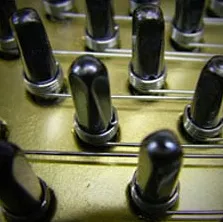What is a Yamaha Gray Market Piano and Serial Number Lookup

What is a Yamaha Gray Market Piano?
"Gray market" is a misnomer for pianos that were not properly seasoned for the North American and European markets. These pianos are scarcely documented by Yamaha and are generally discouraged to purchase.
As a Piano Technician I've seen exactly why gray market pianos are different including all of the tiny details related to servicing Yamaha grey market pianos.
Yamaha gray market pianos were produced in Hamamatsu, Japan between 1971 and 1990 and there is absolutely no factory warranty coverage.
Tech Take-away about Yamaha Gray Market Pianos (TLDR)
I simply would not own a Gray Market Piano unless I lived in a humid climate like in Eastern Asia, and even then, the Gray Market pianos of this era often have undesirable tonality imperfections. Learn more in my popular article: Yamaha GB1K Baby Grand Piano Review.
How can you tell if a Yamaha is a Gray Market Piano?
"Dead Give-aways":
The color of the pins are "blued" instead of silver/gray
Loose pins and comparatively poor tuning stability
The Polished Ebony (black pianos) may have a wavy characteristic to it. It looks as though it was "machined."
A bronze inlay (smaller than a dog tag) on the lid with the serial number.
Undesirable tonal imperfections, specifically near the bass break.
Further explanation of Gray Market Piano Details
If the pins are "blued" it is likely a gray market piano, meaning that the wood has not been tempered for the North American and European climates.
Loose pins are a significant disadvantage. The feel of the tuning pins in the pin block gives clues to how well the piano will remain in-tune overtime. (it is obvious to notice from the perspective of a piano technician).
Generally you have to tap down pins due to the improper seasoning of the wood which results in loose pins.
As a consequence Yamaha Gray Market pianos from this time period manufactured in Hamamatsu, will drastically fluctuate due to the wood not being properly seasoned for dry climates. (North America and Europe)
Gray market pianos were built without consideration for exportation and as a result, the pianos integrity is affected as evidenced by loose pins and poor tuning stability.
How do I find out my Piano is Gray Market?
You can easily tell if your Yamaha piano is a gray market piano by searching the serial number in Yamaha's search page. You will know that your piano is a gray market piano if it generates the following response:
"The entered serial number ******* was not made for the US market , OR this may not be Acoustic Pianos Serial Number. Please verify."
Search Here: Yamaha Serial Number Lookup
It is also important to note that some piano dealers are choosing against selling "gray market" pianos because of all of the underlying factors.
David Durben (below) is now retired. However, his guidance is greatly appreciated and his wisdom continues to serve technicians like me. Thank you, David!!
To quote Yamaha Corporation of America Lead Technician and Tuner Dave Durben, which is written on Yamaha's own website:
"There is absolutely no factory warranty coverage on gray market pianos, so if you ever need any of the (likely, and unlikely expensive) repairs cited above – or any other repairs, for that matter – you’re strictly on your own."
Source: Dave Durben - Four Things You Need To Know About Gray Market Pianos
How did Yamaha Gray Market Pianos came to America?
As the story goes, an American business man relocated many of these "gray market" pianos as an export to the U.S. with Yamaha's explicit disapproval.
The unknown businessman saw the opportunity and sent them across the globe to much dryer locations where they were not intended to belong.
How much do Yamaha gray market upright and grand pianos cost?
Email my Colleague for direct pricing: Peter Creighton Email
Peter Creighton
Need a cheat sheet for negotiating price? See the Piano Buyer Book on Amazon
Read: My Review of the Piano Buyer Book
Save thousands of dollars with this $20 book.
Final thoughts on Gray Market Pianos
So long as this piano were going to be kept in Japan or eastern Asia, would be the best case for enjoyability of this piano. Although, tonality issues near the bass break give me pause to ever own a Gray Market grand piano.




